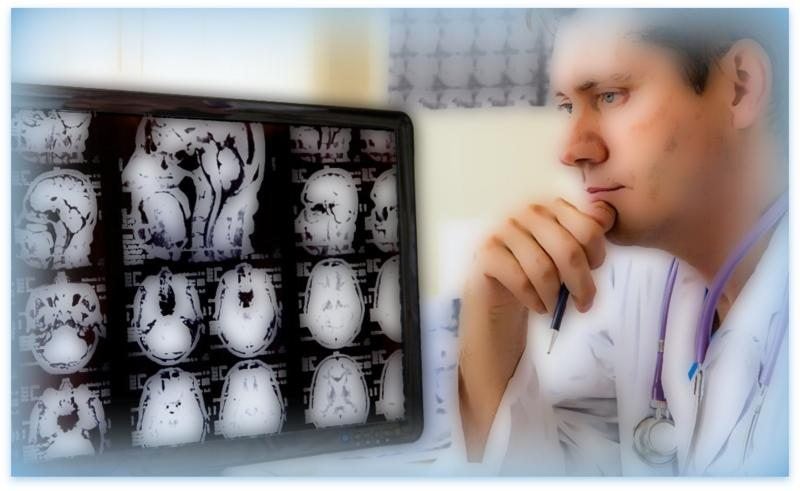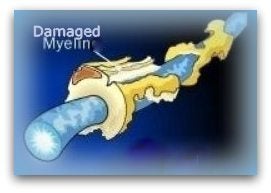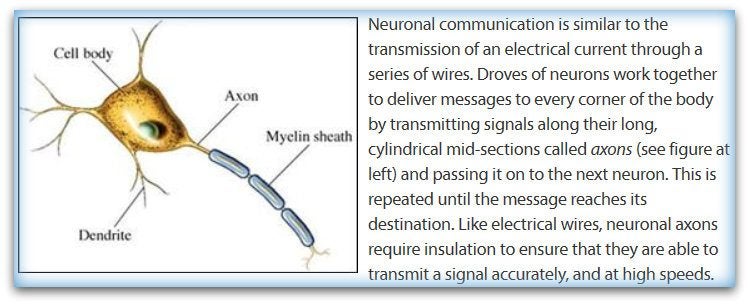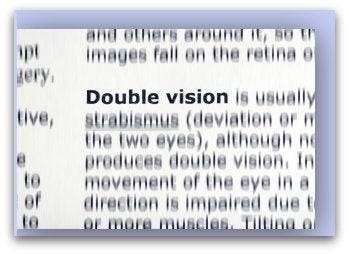Multiple sclerosis, MS

MS
Multiple sclerosis, derived from the Latin multiplum, multiple and Greek sklerosis, induration, usually abbreviated to MS, is a disease of the central nervous system. MS is considered to be an immune-mediated disease in which the body’s immune system mistakenly attacks myelin in the central nervous system. It is a disease by which patches of inflammation occur in parts of the brain and/or spinal cord. This can cause damage to parts of the brain and lead to various symptoms.
| NB! Each MS (multiple sclerosis) patient may experience different symptoms of MS, which might last for a long period of time, come and go sporadically, or even disappear altogether. Symptoms of MS vary according to the specific location and extent of damage. |
Damaged myelin:
Many thousands of nerve fibres transmit tiny electrical impulses (messages) between different parts of the brain and spinal cord. Each nerve fibre in the brain and spinal cord is surrounded by a protective sheath made from a substance called myelin. The myelin sheath acts like the insulation around an electrical wire, and is needed for the electrical impulses to travel correctly along the nerve fibre. In MS, immune system T cells pass from the bloodstream into the central nervous system to attack the myelin coating around nerve fibers.


Possible Symptoms (varies from person to person and range from mild to severe):
Multiple sclerosis symptoms vary widely because, for each patient, the central nervous system sustains damage in different areas and to different extents. Multiple sclerosis symptoms can interfere with vision, muscle coordination and strength, physical sensations and brain function.
Multiple sclerosis symptoms connected to sight and vision include blurred vision, distorted colors (particularly red and green), eye pain and even vision loss. Doctors may also notice abnormal responses to routine eye movement tests in affected patients.


double vision after MS / nystagmus after MS
MS can also impact motor function. Clumsiness, difficulty walking and balancing, feelings of weakness or fatigue, problems with coordination, stiffness and even paralysis are other common symptoms. MS patients can also experience uncomfortable sensations throughout the body, like numbness or prickling.
Multiple sclerosis symptoms relating to brain function can include slurred speech and memory loss, however MS patients may have other neurological problems, that varies from person to person; including loss of bladder control, depression and trouble with concentration and judgment. In some extreme cases, they may lose the ability to talk and write.
Possible problems:
Fatigue
Eye problems
Hearing disorders
Muscle weakness and Spasticity
Cognitive problems:
- Decreased concentration
- Slow thinking
- Word finding difficulties
Slurred speech (dysarthria)
Difficulty speaking (feeling like having a thick tongue)
Feeling Disorders: tingling / numbness / numbness in the hands, eg
Coordination problems with walking / jerky movements (ataxia)
Vision problems
- nystagmus, — uncontrolled horizontal or vertical eye movements
- diplopia — double vision
- optic neuritis — inflammation of the optic nerve or lesions
Bowel problems
Bladder problems:
- Frequency and/or urgency of urination
- Hesitancy in starting urination
- Frequent nighttime urination (known as nocturia)
- Incontinence (the inability to hold in urine)
Pain
Sexual problems
Many people with MS experience a temporary worsening of their symptoms when the weather is very hot or humid or they run a fever.
- More common symptoms
- Less common symptoms
- Secondary and tertiary symptoms
- Invisible symptoms (videos)
Relapse:
A relapse is an acute deterioration due to Multiple Sclerosis.
"An unprovoked and unexpected appearance of a new symptom, or the return of an old symptom, for more than 24 hours to weeks"
It is also called exacerbation or attack. The occurrence of these symptoms should not be associated with fever, infection or stopping / starting of any treatment. A relapse develops for several days, then remains constant for three or four weeks, and gradually disappears within a period of about one month.
At the moment a relapse occurs, there is an acute inflammation on one or more locations in the central nervous system. In this inflammatory process the blood vessels surrounding the nerve fibers are involved and they provide a slight swelling of the nerve tissue. This complicates the information transfer (conduction) between nerve cells in the brains.
Forms of multiple sclerosis:
- Relapsing-remitting MS (RRMS)
Nearly nine out ten people with MS have the common relapsing-remitting form of the disease. A relapse is when an episode (attack) of symptoms occurs. During a relapse, symptoms develop and may last for days, but usually last for 2-6 weeks. They sometimes last for several months. Symptoms then ease or disappear (remit). That is why some people with MS can walk again, whilst they were sitting in a wheelchair before. You are said to be in remission when symptoms have eased or gone away. Further relapses then occur from time to time. Read more....

- Secondary Progressive (SPMS)
After a number of years many people who have had relapsing/remitting MS will pass into a secondary progressive phase of the disease. This is characterised by a gradual worsening of the disease between relapses. Learn more thanks to http://www.mult-sclerosis.org/

- Progressive Relapsing Multiple Sclerosis (PRMS)
There is significant recovery immediately following a relapse but between relapses there is a gradual worsening of symptoms. This form of MS follows a progressive course from onset, punctuated by relapses.

- Primary Progressive (PPMS)
A gradual progression of the disease from its onset with no remissions at all. There may be periods of a leveling off of disease activity and, as with secondary progressive, there may be good and bad days or weeks. Read more...

Read more...
Read more.. Take a deeper look into the symptoms of MS and the tools used to make the diagnosis...
Some videos on MS and living with MS:
More information
- Multiple Sclerosis International Federation
- National Institute of Neurological Disorders and Stroke
- Healthy Lifestyle Blog
- Rayur.com
Resources: Patient Co UK, http://www.patient.co.uk/health/multiple-sclerosis-leaflet, http://www.lef.org/protocols/neurological/multiple_sclerosis_01.htm, Life extension, hersenletsel-uitleg, National Multiple Sclerosis Society www.nationalmssociety.org/ National Institute of Neurological Disorders and Stroke (NINDS).